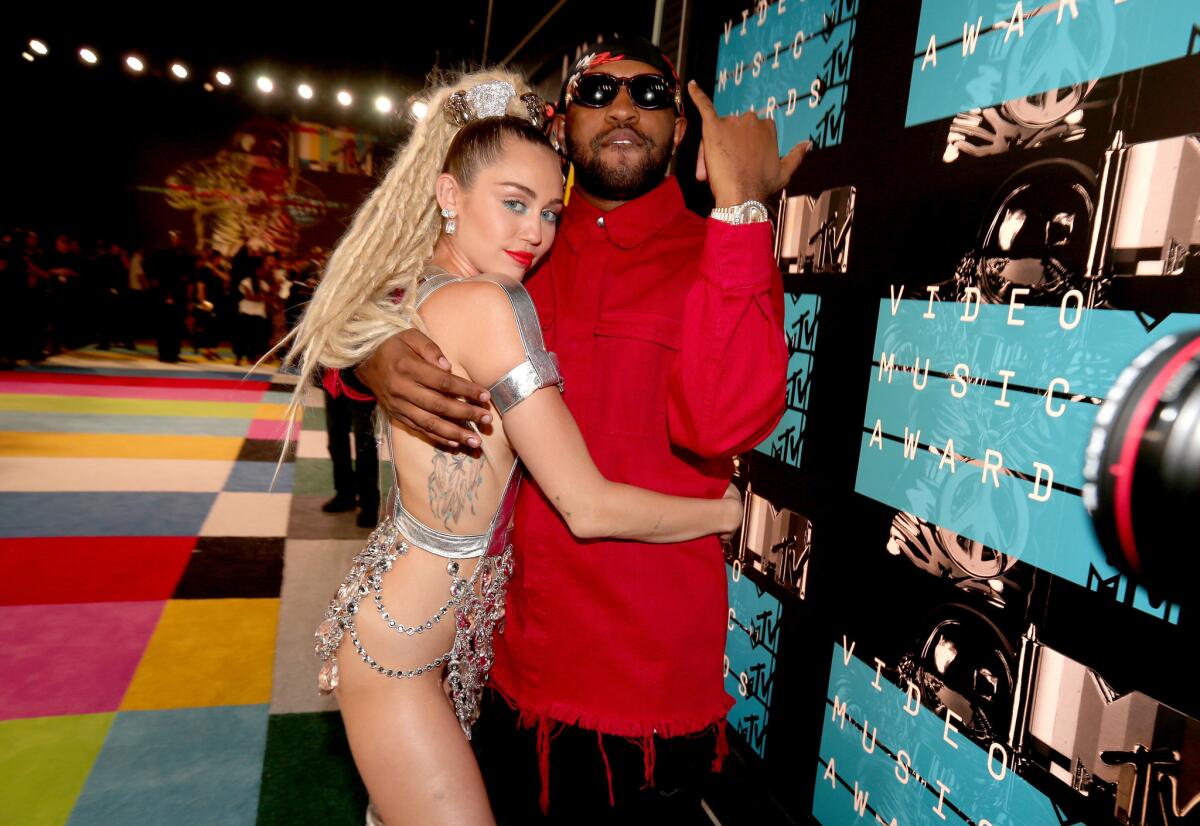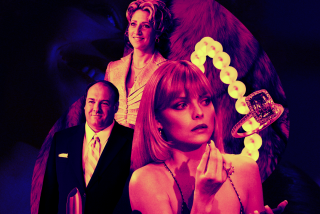Op-Ed: Should Miley Cyrus wear dreadlocks?

Show host Miley Cyrus and music producer Michael Len Williams II pose outside the 2015 MTV Video Music Awards, held at the Microsoft Theater in downtown L.A. on Aug. 30.
The belief that “cultural appropriation” is offensive or even evil is hardly new; when members of one culture adopt elements of another, discomfort is a fairly common response. Yet the scolds seem to be gaining momentum. Many college campuses, including my own (where the issue is sombreros), have been the scene of “appropriation” controversies.
Poster girls for recent brouhahas include Iggy Azalea (a young Australian rapper who sounds a lot like a black American) and Miley Cyrus (who had the audacity to wear dreadlocks when she hosted the Video Music Awards on MTV). Amandla Stenberg, who played Rue in “The Hunger Games,” even made a video titled “Don’t Cash Crop My Cornrows” citing “rampant” cultural appropriation in Cyrus’ hairstyles and dance moves, as well as Katy Perry’s slang.
It’s certainly problematic when the “appropriated” culture is ridiculed or the appropriation is merely stereotypical. But overall, I am in favor of the practice, and I don’t think we can or should do without it. Appropriate with some respect, I say, but also with considerable insouciance.
If Cyrus shouldn’t wear dreadlocks, perhaps no black woman should straighten her hair. Cultural appropriation works both ways, and the accusation works both ways too: A black person “appropriating white culture” may be accused of being a race traitor or, as the Obamas occasionally have been, of not acting “black enough.” But the recent objections focus on white people — or more widely, members of dominant cultures — appropriating bits and pieces of the cultures they have dominated.
For a number of reasons, popular music has been a central scene of this sort of controversy for a century. Well, here’s one reason: Without cultural appropriation, there is no popular music at all. If we were prohibiting cultural appropriation, we would have to ban Benny Goodman, Hank Williams, Elvis, the Beatles, the Rolling Stones, Eric Clapton, Janis Joplin, Eminem. That, I think, would leave us all culturally impoverished.
Taking it from the other angle, African American culture could never have generated the blues, jazz, gospel, soul, funk or hip-hop without European American music, instruments, recording technologies and so on. The styles are racially and culturally syncretic from the outset. I hope no one would argue that because the cornet originated in Europe, we should snatch it out of Louis Armstrong’s hands.
Indeed, virtually the entire history of art would be impossible without cultural appropriation. The classical Greeks, for example, swiped and then developed the style of the Egyptians.
Critics of cultural appropriation — at least the ones most active today — appear to believe that cultures are or could be independent spheres, totally insulated from one another. They seem to assume an ideal of cultural segregation that ignores roughly all of human history. Few cultures have ever been isolated from all others. And though they probably don’t realize it, in their rhetoric they echo far-right-wing calls for racial purity and anxiety about social hygiene.
Do we really want to start imposing tests on people for their cultural or racial purity? How would each of us perform on such a test?
In part because the concept of “culture” is so liquid and vague, people’s cultural memberships are, always, multiple and ambiguous; we are all the products of miscegenation. Hank Williams and Muddy Waters were both blues singers.
Now, did they or did they not emerge from the same culture? One is, I suppose, predominantly European American; the other is predominantly African American. But they were raised around the same time in the Deep South. They both came from poverty. It is likely that they were raised, broadly speaking, in the same religious tradition. They spoke the same language, with some variations. Perhaps they favored the same booze, listened to the same radio stations or visited the same red light district in New Orleans. Now, are they or are they not members of the same culture? (Side note: Prohibiting cultural appropriation would entail prohibiting New Orleans altogether.)
In other words, cultures are not as distinct as the opponents of appropriation seem to think. And in an era of globalization, this fact bleeds out across the world. A young woman growing up in Queens, N.Y. (Nicki Minaj, for example) might have a lot in common with a young woman growing up in Mullumbimby, New South Wales (such as Iggy Azalea). Certainly they grew up in overlapping musical, linguistic and visual cultures.
There have definitely been cases in which, for example, white people used music they borrowed or outright stole from black people to make money, while the original artists remained poor — though just as often white artists celebrated and enhanced the careers and incomes of the black artists they “appropriated.” If you are concerned that Iggy is cutting into Nicki’s income, I’d say you should find something more worrisome to worry about.
Crispin Sartwell teaches philosophy at Dickinson College in Carlisle, Pa. He is the author of “Act Like You Know: African-American Autobiography and White Identity.”
Follow the Opinion section on Twitter @latimesopinion and Facebook
More to Read
A cure for the common opinion
Get thought-provoking perspectives with our weekly newsletter.
You may occasionally receive promotional content from the Los Angeles Times.






